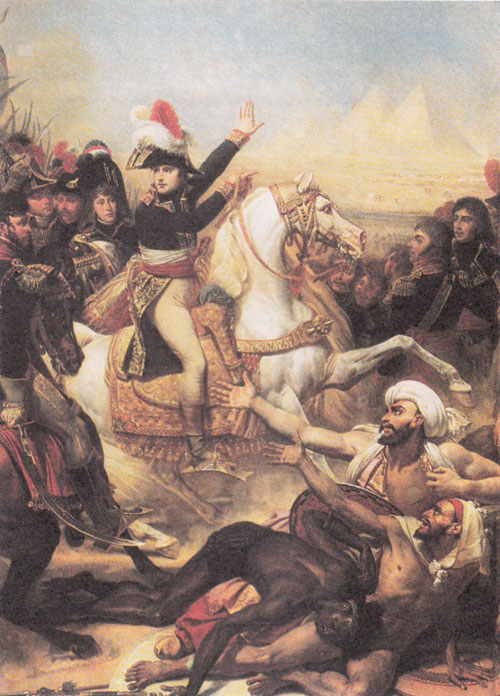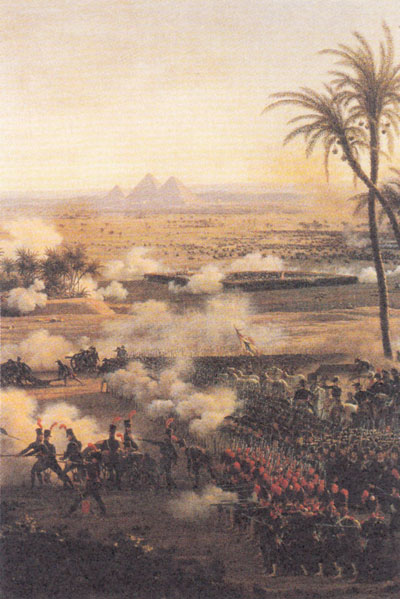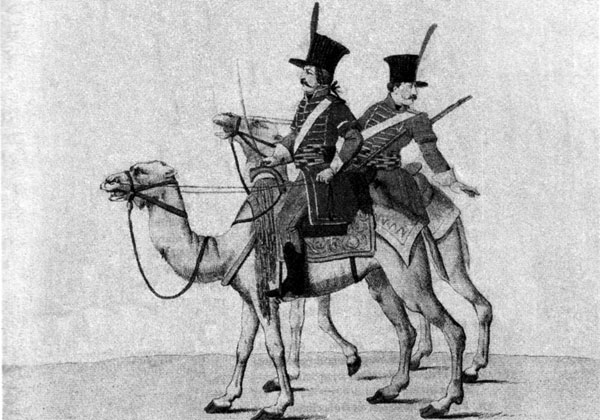Napoleon - Napoleon and the Orient
Book II - Napoleon and the Orient
The East only wants a man.
The master of Egypt is the master of India.
— Napoleon
Perhaps no epoch in Napoleon's life is so intensely interesting or furnishes such an opportunity to analyse his character, philosophy, and religious opinions than that of his Egyptian expedition, for he is there under the seductive influence of the Orient, that ever since early days had deeply fascinated him and affected his imagination. What we here find, which is truly unique in the history of human nature, not without a tinge of the uncanny, and which the profoundest psychologist would study in vain for a solution, is the contact of the most stupendous intellectual riddle of modern times with the mysteries of the unsolvable East.
To what a degree he was influenced by the Orient is clearly shown in his conversations with Gourgaud, years later, in Saint Helena, when he expatiates largely on Mohammedanism, placing it above Christianity, as being simpler and to him more convincing, seeing that it took considerably less time to propagate than the latter.
The Sheiks, moreover, seem to have made a deep impression upon him when they declared the followers of Christ to be little better than pagans in worshiping three deities.
At the same time he professes himself a materialist, at least he affirms as much to Gourgaud and denies the Divinity of Christ, and yet he declares that he believes in a God. "Everything," he says, "proclaims the existence of a God. That cannot be questioned." Still he cannot reconcile himself to religion. All religions, he avers, are the invention of men. Why should there be so many?
If the Christian religion is the true one, why has it not always existed? What, he asks, has become of all the virtuous men who have existed before its foundation? His own existence is beyond his comprehension, for he compares himself to a watch with all its works in motion but which is yet unconscious of its existence. He attributes all religious dissensions to the fraud and falsehood of the priests, and his own scepticism with regard to religion in a great measure to their iniquity and rapacity. ... The admission, `Je suis Catholique parce que mon pere l'etait et parce que c'etait la religion de la France" (I am a Catholic because my father was Catholic and because it was France's religion) is nothing less than an avowal that choice had little to do with the fact that he was a Roman Catholic. This absence of a sense of religion in his incomprehensible nature is imputable to the man's extraordinary force of character, the illimitable power he exercised over human destiny, and to his vast superiority over all other men. The bloodstained fields of sixty battles, with their myriads of dead and dying, exhibited to him life in its darkest and most hideous form, and, naturally enough, made him a sceptic and pessimist. At Saint Helena he affirmed to Gourgaud that war and the continuous sight of the dead made him a materialist, that everything is matter and death ends all. His superhuman faculties, that raised him so immeasurably above the rest of mankind, his pre-eminence in war and statecraft, and in whatever conduced to accelerate the understanding, tended to alienate him from humanity and likewise from all religious affinities. That he estimated his greatness to be paramount to that of any human being in existence is attested by his assertion that he was different to other men; morality-political, social, or otherwise - and the everyday principles of life were, he declared, very well for ordinary mortals, but could not be aptly applied to him. Viewing them in reference to himself, to his mind they conveyed no meaning except in the abstract. Scruples he set aside, conscience he discarded, and set himself above humanity. Had he been religious, would he have debased the Pope, degraded him in the eyes of the world, stripped him of all temporal power and cast him into abject captivity? He truly remarked that had he
been religious he could never have achieved what he did - and this is undoubtedly true.
Yet the composition of this perplexing human problem is not wholly devoid of superstition akin to Deism; for what motive is it that prompts him on the ship 1'Orient, during his journey to Egypt, to designate to the savants who accompanied him the starstrewn firmament of night, and ask, "But, Messieurs, who made all that?" in refutation of their assertion that all is matter, and of the non-existence of a Divine Ruler, if it be not a conviction in him of the presence of an All-provident Being?
Of all Napoleon's astounding undertakings, both of a civil and military character, this Eastern expedition in many respects takes precedence as being so full of striking contrasts and dramatic effect, where we see the diverse phases of his resplendent mind in full play, brilliantly illumined by the light of his originality.
The marvellous facility with which he assimilates his intensely modern and practical individuality with the languor of the elusive Orient is as remarkable as the ingenuity and diversity of his complex nature.
At one time he discourses with the Muftis or Imams of Cairo with a fervency that would have done credit to an Eastern zealot; at another he announces himself and his followers to be faithful Mohammedans, for he says, addressing the Egyptians, "Are we not true Moslems? Is it not we that overthrew the Pope and destroyed the Knights of Malta, who bade Christendom wage war against you?" Then he stands in the light of a liberator - had he not come to deliver them from the oppression of the detested Mameluke?
By similar promulgations he endeavoured (on the whole with remarkable success) to reconcile the Egyptians to the foreign invasion. The grandiloquence of their wording illustrates how fully he appreciated the impressionable temperament of the Oriental, so prone to be influenced by a display of personal or rhetorical extravagance and susceptible to whatever has a proclivity to stimulate the imagination.
As a prelude to the battle which he is about to wage at the

Napoleon encouraging his troops, “Soldiers, from the summit of these pyramids forty centuries look down upon you”.

The Battle of the Pyramids
foot of the Pyramids against the chivalry of the East, he infuses additional enthusiasm into his legions with the stirring but somewhat dramatic address, "Soldiers, from the summit of these ancient monuments forty centuries look down upon you" - words well befitting the situation and circumstances, and calculated to appeal effectively to the highest ideals of a heroic soldiery, and impart to them a superabundance of militant animation. Never did Napoleon's genius shine with a brighter lustre, in the midst of adversity, than during this sojourn in the East. The disaster of the Nile, where his fleet was all but annihilated, far from depressing his indomitable spirit, or reducing his energy, only tended to accelerate the vigour of his resourceful mind and acted as a powerful lever to his inherent propensity for administration and invention.
Cut off from France and all intercourse with Europe, with the British fleet triumphant in the Mediterranean, he, with a soul serene and undaunted, turned his attention to the development of the arts of peace and progress, to husbandry, science, astronomy, and to topographical surveys of the country, the Delta and the Nile. The archaeological wonders of Memphis now met for the first time the profane gaze of Western civilisation. Corn, rice, and vine were cultivated, bakeries, foundries, and workshops were constructed, and buildings erected for the manufacture of gunpowder. These manifold undertakings were carried out with a celerity rarely if ever equalled, considering the scanty resources at his disposal. Perceiving the great swiftness and power of endurance of the camel and its natural immunity from the rigorous heat of the climate, he, with his innate propensity for improvement, innovated a special camel corps, attached to his army - the first corps of its kind in Egypt - principally for the purpose of harassing the enemy in the open desert and the transmission of intelligence. Last, but not least, he founded at Cairo the Institute of Egypt, a society composed of physicists, with Monge as president, whose aim was the propounding and advancement of scientific knowledge.
Thus Egypt, under his enlightened and vigorous rule, saw

herself emancipated from the trammels of semi-barbarism that for centuries had kept her former intellectual splendour in subjection, and beheld in him the restorer of her most glorious era (when she centred in herself the learning and culture of civilisation1), resuscitated, as it were, from an age of ignorance, and henceforth to be distinguished as the Renaissance in Egypt.
Egypt, after Napoleon's exit, relapsed into a state of lethargy, from which she was not to be roused until the genius of Mehemet Ali once more drew upon herself the attention of the world, recalling the exploits of a far rarer and brighter luminary.
1. During the reign of the Ptolemies, especially the reign of Ptolemy Philadelphus, who built the museum and founded the Library of Alexandria and encouraged literature.
Related Books
- Alexander the Great
- Arguments for The Existence of God
- But it is done
- Catherine The Great
- Danton
- Episodes from Raghuvamsham of Kalidasa
- Gods and The World
- Homer and The Iliad - Sri Aurobindo and Ilion
- Indian Institute of Teacher Education
- Joan of Arc
- Lenin
- Leonardo Da Vinci
- Lincoln Idealist and Pragmatist
- Marie Sklodowska Curie
- Mystery and Excellence on The Human Body
- Nachiketas
- Nala and Damayanti
- Napoleon
- Parvati's Tapasya
- Science and Spirituality
- Socrates
- Sri Krishna in Brindavan
- Sri Rama
- Svapnavasavadattam
- Taittiriya Upanishad
- The Aim of Life
- The Crucifixion
- The Good Teacher and The Good Pupil
- The Power of Love
- The Siege of Troy
- Uniting Men - Jean Monnet